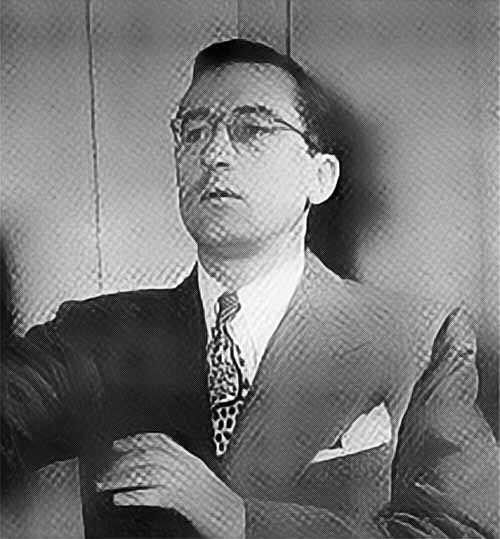
Composer, arranger, conductor
Lyn Murray conducted the orchestra and chorus on the 1944 Decca album A 368. He most famously worked with Alfred Hitchcock when he scored To Catch a Thief in 1955. The booklet on this album described him so:
Lyn Murray, the famous arranger and choral director, was born in London, the son of a British naval engineer. He spent his childhood in the Haymarket, Leicester Square and Hammersmith, where England’s most popular music halls stood. In 1925 the Murray family journeyed to the United States and settled in Philadelphia. Although Lyn liked the Quaker City, he liked the sea better; and when he was 17, he began a three-week vagabond trip on a freighter. This trip extended to six months. His next trip, on an oil tanker, was short-lived because his mother took him off bodily just before the vessel sailed. So ended this adventure.
He then calmed down and finished his high school course in fundamentals of music. After graduation he worked on several newspapers. Soon he decided that music was a far more advantageous profession, and he accepted a $15-a-week position as church organist. He probably inherited his musical talent from his mother, who had some skill as an amateur musician.
At 19 Lyn traveled the vaudeville circuits as a pianist, later going on to lead an orchestra in a Newark, N. J., night club. In the meantime he arranged popular airs, a work which rapidly established him in his profession.
Radio work at Newport News, Va., made him, by 1930, a microphone favorite. He was later called to WCAU to take charge of singers and put on a novelty program, “Bill and Ginger.” In this work he was so successful that he was called to the master CBS station, WABC in New York, to direct orchestras and choral groups. Since the beginning of his radio career, Murray’s work has included coaching vocalists, playing piano for several choral groups, arranging and rehearsing his own trios and quartets, and conducting his own orchestra for some programs of distinction. At present he can be found on the Squibb program, “To Your Good Health,” and as musical conductor for various Norman Corwin broadcasts.
